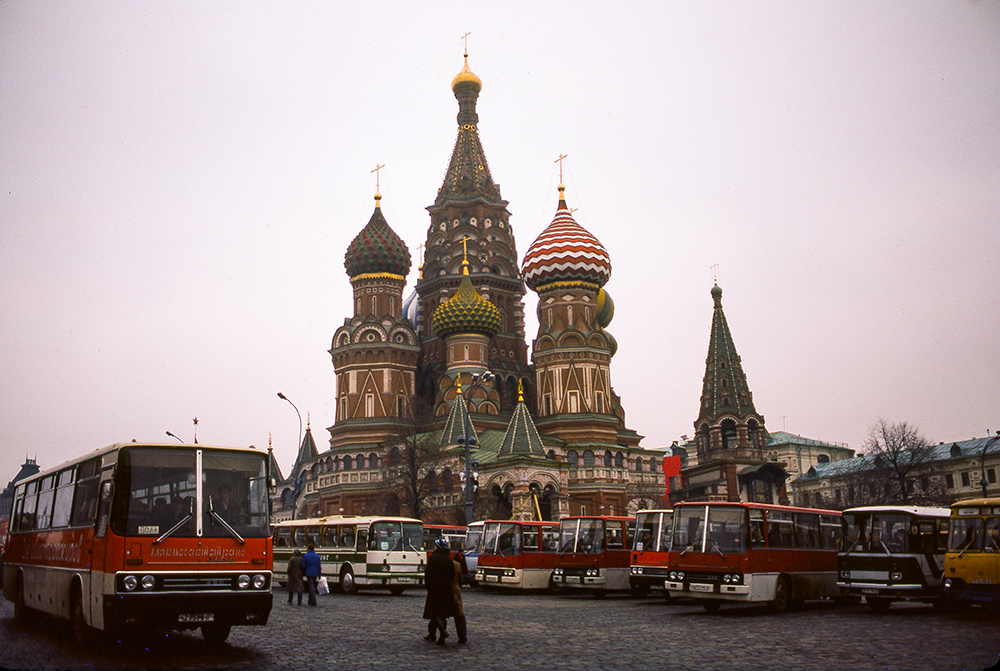My kids, at our local comprehensive, go on school trips to Leigh-on-Sea. I went to a much fancier school, so I went on school trips to Leningrad and Moscow. The first time must have been in 1990. We were all going through dramatic changes; and so was Russia – not that as cossetted, self-absorbed 16-year-olds we were able to take much serious notice.
We joked, nervously, gauchely, ahead of our departure about the likelihood that an Aeroflot flight could be relied upon to get us there in one piece. We practised our rudimentary GCSE Russian: ‘Chto eto? Eto GUM!’ (What’s that? That’s [the department store] – GUM.’) ‘Gdye Dom Knigi?’ (Where’s the bookshop?) ‘Chepukha! Vzdor!’ (Rubbish! Nonsense!) And a favourite as we studied Russian’s eccentric tense system and verbs of motion in interminable double-lessons, ‘Ochen’ skuchno’ (Very boring).
I recall the scale, and the shabbiness, and the grandeur. How nothing worked
We had no idea what an alien world we were entering. I wish I had understood it better, noticed more, taken more in. We treated the trip, I think, not so much as an opportunity for cultural enlargement or a glimpse of the last days of a momentous era in 20th-century history, but as a trolley-dash for Soviet kitsch. We were all determined to come back with pocketfuls of znachki (enamel lapel badges with hammers and sickles), propaganda posters, busts of Lenin, Red Army greatcoats and military shapki (hats). And we did: that was what the Russians sold to tourists in 1990, and the supply was abundant. The faces of mass-murderers, the relics of a busted ideology, were now sold to teenagers as souvenirs.
We were billeted in a vast, sepulchral, tatty Soviet hotel. The only other time I’ve seen its like was in Havana. We were baffled and horrified by the food. Breakfast was kasha (buckwheat porridge), followed by yeitso (eggs) – the latter a wobbling cube of jelly made from powdered egg, alone on a plate, which remains to this day the most disgusting thing I have ever put in my mouth. As we made retching noises, our Russian teacher – who had already lost his patience at our jibes at Aeroflot – reminded us sternly that the waiters wouldn’t see even powdered egg from one week to the next, so we should bloody well show some respect and eat it. Sugared grated carrot. Dill on everything. Borscht: delicious.
I recall the scale, and the shabbiness, and the grandeur. How nothing worked: you had to queue three times to buy your copy of The Bronze Horseman in Dom Knigi, an experience then only replicated in the West by Foyles on the Charing Cross Road. How half the places you turned up to had declared a sanitarnei den (cleaning day) and were randomly shut. Outside every Metro station, there were old women in threadbare greatcoats begging for kopeks. Commuters bought great bottles of strong beer from kiosks and swigged from them as they walked to the bus stop. We took advantage, as 16-year-old boys will, of the alcoholic ambience. We got drunk on bottles of mead – who knew that still existed? – in a hotel bathroom. It was sweet, potent and, again, disgusting.
Dark green marble, and the smell of dust, in the Hermitage; the astounding concentration of Impressionist masterpieces in a handful of rooms in the Pushkin Gallery; St Basil’s illuminated above a Red Square muffled to soundlessness under a soft fall of snow; Leningrad’s canals and its broad European boulevards; Moscow’s great grey brutality (a friend who knows the country well, years later, told me he prefers Moscow: ‘More Russian’). The joke, there, was to point to the Lubyanka and ask the Intourist guide: ‘Chto eto?’ He would unfailingly reply, as if innocently imagining you were pointing to the building next door: ‘Eto GUM.’
The Metro was a miracle. Stations like Orthodox cathedrals: cavernous darkness illuminated not by candles, but by lamps on the escalators that went down further than you could see ahead of you (the Moscow Metro is deep), and vaulting, stucco, mosaics and murals on the platforms. The departure of every train was announced by a recorded voice: ‘Ostorozhno! Dvyeri zakreivaiutso! Slyeduya stantsia: Chekhovskaya…’ (Watch out! Doors closing! Next station: Chekhovskaya…)
There was something soothing, something hypnotic, about being down there late at night in the yellow light, the windows flicker-lit. One evening after a social event with our hosts, our Russian teacher – melancholy, bear-like, alcoholic – sat slumped in the carriage with poached-egg eyes, and we knew we would have to find a way of rousing him, when we got there, so he didn’t miss his stop. He’s gone. It’s all gone.
I remember thinking very clearly, then, that this was a moment in time – the train rocking and clanking sleepily, heading for its destination like the arrows in Zeno’s paradox – which felt as if it could go on forever. Somewhere in my head, it still does.






Comments